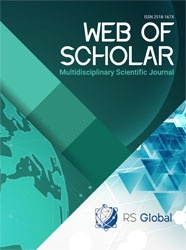ПОРІВНЯЛЬНИЙ АНАЛІЗ ЗМІСТУ ДІЯЛЬНОСТІ ЛОГОПЕДА З ДІЯЛЬНІСТЮ СУМІЖНИХ ФАХІВЦІВ
Abstract
The article compares the content and features of speech therapist activity against the activity of related specialists. The general functions of speech therapist professional activity and related specialists activities are scientific-methodical, cultural-educational, social- pedagogical, educational, and organizational-managerial. Distinctive features of the speech therapist are psychoprophylactic, counseling, correction-developmental, diagnostic-analytical, mastering which characterizes one as a competent specialist in the support of children with speech impairment and ones readiness for professional activity.
References
Бессмертная Н. А. Организационно-педагогические условия развития профессиональной компетентности будущих логопедов сельских образовательных учреждений: дис. канд. пед. наук. Москва. 2003: 168.
Дружиловская О. В. Современный подход к преподаванию дисциплин медико-биологического цикла на дефектологических факультетах педагогических вузов: дис. канд. пед. наук. Москва. 2003: 210.
Жукатинская Е. Н. Формирование профессиональной компетентности будущего учителя-логопеда: дис. канд. пед. наук. Липецк. 2008: 226.
Малофеев Н. Н. Специальное образование в меняющемся мире. Европа Москва. 2009: 319.
Пахомова Н. Г. Стан сформованості рефлексивно-оцінної складової інтегративної професійної підготовки майбутніх логопедів. Актуальні питання корекційної освіти. 2015. (5): 218–227.
Пінчук Ю. В. Система професійної компетентності вчителя-логопеда: дис. ... канд. пед. наук. Київ. 2005: 220.
Стахова Л. Л. Проектирование методической системы развития профессиональной компетентности учителя-логопеда дошкольного образовательного учреждения в условиях профессиональной среды: дис. канд. пед. наук. Тамбов. 2010: 195.
Views:
289
Downloads:
492
Copyright (c) 2019 The author

This work is licensed under a Creative Commons Attribution 4.0 International License.
All articles are published in open-access and licensed under a Creative Commons Attribution 4.0 International License (CC BY 4.0). Hence, authors retain copyright to the content of the articles.
CC BY 4.0 License allows content to be copied, adapted, displayed, distributed, re-published or otherwise re-used for any purpose including for adaptation and commercial use provided the content is attributed.











